The first U.S.-based workshop on integrated multi-trophic aquaculture (IMTA) took place in Port Angeles, Washington on September 14-15, 2010. The workshop attracted scientific experts and researchers along with aquaculturists from around the country. Among the suite of technologies needed to meet increasing demand for seafood, IMTA is a promising technology for expanding marine aquaculture.
The collaboration resulted in a White Paper that went beyond summarizing the workshop; it provides a SWOT analysis (Strengths, Weaknesses, Opportunities, and Threats) to evaluate potential impacts of IMTA and identify potential concerns that must be addressed for IMTA to succeed. The paper also includes workshop highlights, conclusions, links to presentations, and abstracts.
About the Workshop
Portugal did not seem all that far away when Dr. Joao Ferreira appeared on the video screen at Peninsula College in Port Angeles, Washington, on September 14, 2010. Dr. Ferreira was one of the experts who recently participated in the first-ever U.S. workshop on Integrated Multi-Trophic Aquaculture, also known as IMTA. So, even though they were separated by an ocean, a continent, and several time zones, the workshop participants and their featured speaker were in synch as Dr. Ferreira delivered his research findings.
"Significant enhancements occur both to production and environmental quality through the use of IMTA,” Ferreira told the 60-plus participants. “These lessons need to be applied to the West.”
Sponsored by the Pacific Aquaculture Caucus, Peninsula College, the NOAA Aquaculture Office, the Illinois Soybean Association, the Indiana Soybean Alliance, Taylor Shellfish, Umami Sea Vegetables, SEAvision Black Cod, and American Gold Seafood, the two-day workshop attracted scientific experts, researchers, and aquaculturists from the Pacific Northwest, Maine, Texas, and elsewhere. In the United States and Canada, IMTA is an evolving approach to seafood production that emphasizes an ecosystem management approach where ‘fed’ species, such as finfish or shrimp, are farmed in close proximity to species that can ‘extract’ nutrients from the water column, such as shellfish and algae or seaweed.
Whether participants saw IMTA as an emerging technology for growing more seafood or a form of aquaculture already being extensively used in China, interest in the concept was high. “I think we caught people’s attention with this workshop,” said Pacific Aquaculture Caucus President and workshop convener, Dr. Peter Becker. “We provided an open forum where new information was presented and we were willing to discuss all sides.”
Experts discussed a range of topics from the theoretical to the practical, including the history of IMTA in Canada, systems modeling, production methods, biosecurity, chemical and drug use, feeds, disease risk, species selection, economics, and community acceptance.

